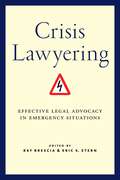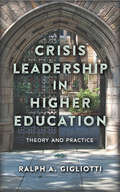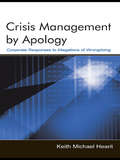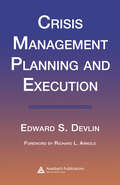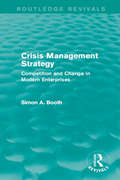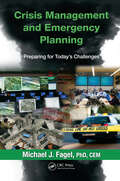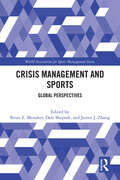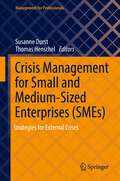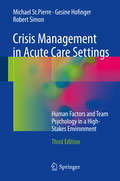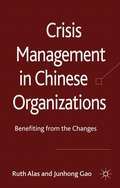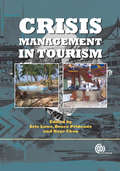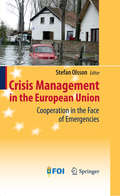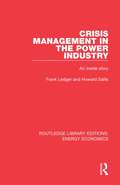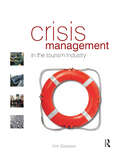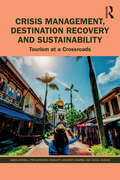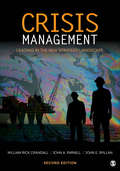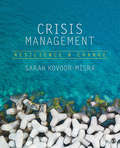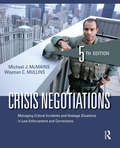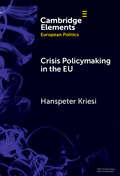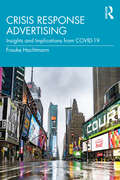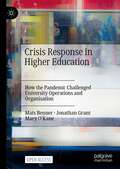- Table View
- List View
Crisis Lawyering: Effective Legal Advocacy in Emergency Situations
by Eric K. Stern Ray BresciaShines a light on the emerging field of law dedicated to responding to and resolving the crises of the twenty-first centuryIn an increasingly globalized world, a complex and interlocking web of nations, governments, non-state actors, laws, and rules affect human behavior. When crisis hits—whether that be extrajudicial detention, unprompted deportation, pandemics, or natural disasters—lawyers are increasingly among the first responders, equipped with the knowledge necessary to navigate the regulations of this ever more complex world.Crisis Lawyering explores this phenomenon and attempts to identify and define what it means to engage in the practice of law in crisis situations. In so doing, it hopes to sketch out the contours of the emerging field of crisis lawyering. Contributors to this volume explore cases surrounding domestic violence; dealing with immigrants in detention and banned from travel; policing in Ferguson, Missouri; the kidnapping of journalists; and climate change, among other crises. Their analysis not only serves as guidance to lawyers in such situations, but also helps others who deal with crises understand those crises—and the role of lawyers in them—better so that they may respond to them more effectively, efficiently, collaboratively and creatively. Crisis Lawyering shines a light on the emerging field of law dedicated to responding to and resolving the complex crises of the twenty-first century.
Crisis Leadership in Higher Education: Theory and Practice
by Ralph A GigliottiThere was a time when crises on college and university campuses were relatively rare. Much has changed, and it has changed quite rapidly. Rather than being isolated incidents requiring the sole attention of presidents, chancellors, or communication professionals, the proliferation of crises across campuses means that crisis leadership has now become fundamental to the work of university personnel across levels, disciplines, and institutions. Drawing upon the findings of forty interviews with senior leaders from ten major research universities across the United States and a content analysis of over one thousand articles from a variety of news outlets, Crisis Leadership in Higher Education presents a theory-informed framework for academic and administrative leaders who must navigate the institutional and environmental crises that are most germane to institutions of higher education. The perspectives offered in this book remind us that it is in the chaos and uncertainty of crisis that leadership becomes most visible and most critical.
Crisis Management By Apology: Corporate Response to Allegations of Wrongdoing (Routledge Communication Series)
by Keith Michael HearitThis volume examines the role of apologia and apology in response to public attack. Author Keith Michael Hearit provides an introduction to these common components of public life, and considers a diverse list of subjects, from public figures and individuals to corporations and institutions. He explores the motivations and rationales behind apologies, and considers the ethics and legal liabilities of these actions. Hearit provides case studies throughout the volume, with many familiar examples from recent events in the United States, as well as an international apology-making case from Japan.The broad-perspective approach of this volume makes the content relevant and appealing to practitioners and scholars in public relations, business communications, and management. It is a valuable text for courses that take a discursive approach to public relations, and it also appeals to readers in business management, examining apology as a response strategy to corporate crises.
Crisis Management Planning and Execution
by Edward S. DevlinCrisis management planning refers to the methodology used by executives to respond to and manage a crisis and is an integral part of a business resumption plan. Crisis Management Planning and Execution explores in detail the concepts of crisis management planning, which involves a number of crises other than physical disaster.Defining th
Crisis Management Strategy: Competition and Change in Modern Enterprises (Routledge Revivals)
by Simon A. BoothCrisis Management Strategy, first published in 1993, is an excellent introduction to the theory and practice of crisis management in modern enterprises. Simon Booth examines the conventional approaches followed by many firms in the face of change and crisis. He warns of the dangers of theories which oversimplify the causes of crisis and their possible solutions, and which overlook the individual nature of each firm and its environment. Instead, a dynamic new vision of crisis management is offered, which takes into account different kinds of crisis demanding diverse solutions. The key role of leadership is also evaluated in relation to both internally and externally generated crises. Drawing on case studies of leading firms facing crisis solutions in a variety of environments, this truly international volume will provide valuable insight into the experience of crisis, risk and uncertainty. This title will be of interest to students of business.
Crisis Management and Emergency Planning: Preparing for Today's Challenges
by Michael J. FagelEmergency managers and officials have seen a tremendous increase in the planning responsibilities placed on their shoulders over the last decade. Crisis Management and Emergency Planning: Preparing for Today's Challenges supplies time-tested insights to help communities and organizations become better prepared to cope with natural and manmade disas
Crisis Management and Sports: Global Perspectives (World Association for Sport Management Series)
by James J. Zhang Brian E. Menaker Dale SheptakIn an increasingly turbulent, insecure and fast-changing world, this book presents case studies of crisis management that help the reader to understand what best practice looks like and how to guide sport organizations through the crises that are an inevitable aspect of commercial life.Featuring the work of leading researchers from ten different countries, and drawing on work in sport management, sport communication and socio-cultural sport studies, the book includes cases from around the world. It explores important themes in contemporary sport management, including resilience in sport organizations; the use of technology in crisis communication; the socio-cultural dimensions of crisis management; reputation and image management; policing and security; and the management of sports events. It also offers examples from a wide range of different sports, including tennis, golf, soccer, gymnastics, mountaineering, rugby, distance running, and the Olympic Games.This book is an essential addition to the library of anybody with an interest in sport business and management, event management, crisis communication, or public relations.
Crisis Management for Small and Medium-Sized Enterprises: Strategies for External Crises (Management for Professionals)
by Susanne Durst Thomas HenschelThis book provides an in-depth introduction to crisis management and leadership in SMEs, as well as methods, approaches and cases against the background of different crises; external ones in particular. Featuring contributions from research and practice, this book covers a plethora of SMEs from different sectors to match the diverse nature of small business practice. The combination of a sound theoretical framework for small firm crisis management along with practical instruments/methods and cases, help to improve the organizational resilience of SMEs. The authors also guide the reader to resources beyond the book, including an online “Crisis Toolkit” comprised of material such as further publications, crisis management blueprints, guidelines, checklists, and company cases on crisis management-related issues.
Crisis Management in Acute Care Settings: Human Factors and Team Psychology in a High-Stakes Environment
by Gesine Hofinger Michael St. Pierre Robert SimonThis book is unique in providing a comprehensive overview of the human factors issues relevant to patient safety during acute care. By elucidating the principles of human behavior and decision-making in critical situations and identifying frequent sources of human error, it will help healthcare professionals provide safer, more effective treatment when dealing with emergencies characterized by uncertainty, high stakes, time pressure, and stress. The third edition has emerged from an ongoing synergistic relationship between clinicians and behavioral scientists on both sides of the Atlantic to update and enhance each chapter -- blending the strengths of the two professions into a readily accessible text. Among other improvements, readers will find sharper articulation of concepts and significantly more information on the organizational impact on individual and team performance. Crisis Management in Acute Care Settings is the required reference for all who are learning about, teaching, or providing acute and emergency healthcare. It will be of high value for undergraduate and graduate medical and nursing program and offer a much-needed resource for those who use high-fidelity healthcare simulation to teach teamwork.
Crisis Management in Chinese Organizations
by Ruth Alas Junhong GaoA theoretical framework on how to manage crises in Chinese organizations. The authors connect crisis management theories with practical examples from Chinese companies tohelp deepen the understanding of Chinese work culture and practices. The authors believe that this volume may contribute to better crisis management not only in Chinese organizations, but also in organizations from other countries. Learning from mistakes and from the positive solutions to such situations could be the key to future success. Improvement in the management of critical situations in organizations could lead to improvements in the economy as a whole.
Crisis Management in Tourism
by Bruce Prideaux Eric Laws Kaye ChonThe history of modern tourism records many localized and some international crises characterized by extreme and sudden reduction in demand for specific destination areas or types of tourism product. Managerial responses to such events include both problem solving and market recovery steps, but these vary in effectiveness and recovery may be slow to occur after the initial problems are overcome. With examples drawn from the UK, Europe, America, Australia and Asia, this book brings together a range of expert academic analysis of the latest thinking and practice in this increasingly important area of tourism management.
Crisis Management in the European Union: Cooperation in the Face of Emergencies
by Stefan OlssonIn less than a decade, Europe has witnessed a series of large-scale natural disasters and two major terrorist attacks. Growing concern about the trans-national effects of these incidents has caused the EU Member States to seek more multilateral cooperation. As a result, a system of common arrangements for handling large-scale emergencies or disasters has emerged, which, due to its quick and ad-hoc development, may seem almost impenetrable to newcomers to the field. This book seeks to provide a much-needed overview of disaster and crisis management systems in the EU. It provides a basic understanding of how EU policy has evolved, the EU's mandate, and above all, a concise and hands-on description of the most central crisis management arrangements. Written by some of Europe's main experts and consultants in the field, this book represents a unique and comprehensive source of information for everyone involved or interested in the European Union crisis management system. "This book will quickly become an indispensable resource for two groups: Practitioners will enjoy its accessible and comprehensive style. Academics curious about this emerging field will turn to it for an introductory overview. As someone who closely studies this field, I find the book engaging, detailed, and accurate, and I read every line with great interest. The authors are to be commended for the quality of research that went into this work." Mark Rhinard, Senior Research Fellow at the Swedish Institute of International Affairs (UI)
Crisis Management in the Power Industry: An Inside Story (Routledge Library Editions: Energy Economics)
by Frank Ledger Howard SallisThis book, originally published in 1995 is a study of crisis management in the electricity supply industry during the 20th century. The full implications of the vulnerability of the industry are examined, with special reference to past industrial action. The authors were well placed to know how close the industry came on more than one occasion to disaster. In the wake of privatisation challenging and controversial questions are asked, which are of fundamental importance to the economy, quality of life and political stability of the country. An account is also given of the past structure, technology and industrial relations of the industry. This volume is an excellent case-study for students of post war politics, public sector management and industrial relations.
Crisis Management in the Tourism Industry
by Dirk GlaesserThe tourism industry is arguably one of the most important sources of income and foreign exchange, and is growing rapidly. However, national and international crises have huge negative economic consequences. Crisis Management in the Tourism Industry aims to illustrate the theories and actions that can be taken to better understand consumer, economic and environmental reaction, in order for the businesses involved to be more prepared for such events. Now in its second edition, this text has been fully revised and extended to include recent events such as Bali, SARS and international terrorism, expanding sections such as:* Terrorism and criminal activities* Risk perceptions and the influencing variables* The stakeholder concepts* Analysis methods- visibility of advantages/disadvantages of methods* Marketing instruments and best practicesWritten by one of the world's leading experts from the World Tourism Organisation, the book has global coverage, and presents international, up-to-date case studies and examples from countries such as the UK, Australia and USA. The book provides discussion of:* The influential effect of the mass media How crises effect the purchase decision process Destination branding/image and its manipulation Preventative crises management and strategiesCrisis Management in the Tourism Industry is an essential guide to explaining how the tourism industry can prepare and succeed in the face of the effects of crises.
Crisis Management, Destination Recovery and Sustainability: Tourism at a Crossroads
by James Kennell Azizul Hassan Anukrati Sharma Priyakrushna MohantyThe COVID-19 pandemic brought travel to a halt and the global tourism industry has been one of the sectors hit hardest during the pandemic. This book looks at how the tourism industry can enhance its resilience and prepare for future crises more effectively. The book provides insights into the economic, social, geopolitical and environmental implications of the COVID-19 pandemic on the tourism and hospitality industries and the responses in diverse international contexts. It highlights key concepts and includes cases with real-life applications. The book also discusses future research directions in a post-pandemic scenario. This book will be an invaluable resource for practitioners in the areas of tourism and crisis management and for readers to compare and contrast tourism destination recovery and crisis management practices through different research methodologies and settings.
Crisis Management: Leading in the New Strategy Landscape
by John E. Spillan William Rick Crandall John A. ParnellOffering a strategic orientation to crisis management, this fully updated edition of Crisis Management: Leading in the New Strategy Landscape, Second Edition by William "Rick" Crandall, John A. Parnell, and John E. Spillan helps readers understand the importance of planning for crises within the wider framework of an organization's regular strategic management process. This strikingly engaging and easy-to-follow text focuses on a four-stage crisis management framework: 1) Landscape Survey: identifying potential crisis vulnerabilities, 2) Strategic Planning: organizing the crisis management team and writing the plan, 3) Crisis Management: addressing the crisis when it occurs, and 4) Organizational Learning: applying lessons from crises so they will be prevented or mitigated in the future.
Crisis Management: Resilience and Change
by Sarah Kovoor-MisraModern organizational crises are complex, diverse, and frequent. Ineffective crisis management can result in catastrophic loss. Crisis Management: Resilience and Change introduces students to best practices for preventing, containing, and learning from crises in our global, media-driven society. While covering the strengths of existing works on crisis management, such as systems, leadership, communication, and stakeholder perspective, this innovative new text goes beyond to include global, ethical, change, and emotional aspects of crisis communication. Using her proven transformative crisis management framework, Sarah Kovoor-Misra illustrates how organizations of all sizes can be adaptable, proactive, resilient, and ethical in the face of calamity.
Crisis Management: Resilience and Change
by Sarah Kovoor-MisraModern organizational crises are complex, diverse, and frequent. Ineffective crisis management can result in catastrophic loss. Crisis Management: Resilience and Change introduces students to best practices for preventing, containing, and learning from crises in our global, media-driven society. While covering the strengths of existing works on crisis management, such as systems, leadership, communication, and stakeholder perspective, this innovative new text goes beyond to include global, ethical, change, and emotional aspects of crisis communication. Using her proven transformative crisis management framework, Sarah Kovoor-Misra illustrates how organizations of all sizes can be adaptable, proactive, resilient, and ethical in the face of calamity.
Crisis Negotiations: Managing Critical Incidents and Hostage Situations in Law Enforcement and Corrections
by Michael J. Mcmains Wayman C. MullinsLeading authorities on negotiations present the result of years of research, application, testing and experimentation, and practical experience. Principles and applications from numerous disciplines are combined to create a conceptual framework for the hostage negotiator. Ideas and concepts are explained so that the practicing negotiator can apply the principles outlined.
Crisis Policymaking in the EU: The COVID-19 Crisis and the Refugee Crisis 2015-16 Compared (Elements in European Politics)
by Hanspeter KriesiThis Element compares crisis-specific policymaking, its causes and consequences, at the two levels of the EU polity during the COVID-19 and the refugee crisis 2015–16. In both crises, EU policymaking responded to exogenous pressure and was dominated by executive decision-making. Still, it also differed in three critical aspects: it was much more salient, consensual, and effective during the COVID-19 than the refugee crisis. The present study accounts for both similarities and differences, which it attempts to explain by features of the nature of the crises. The key argument of the study is that the policymaking process during crises is, to a large extent, determined by the crisis situation – the crisis-specific functional problem pressure, the institutional context (of the EU polity), and the corresponding political pressure at the origin of a given crisis. This title is also available as Open Access on Cambridge Core.
Crisis Recognition: Where There's Smoke, There's Fire
by Richard LueckeSometimes a crisis ignites slowly, without announcing itself. This chapter addresses the problem of crisis recognition, highlighting some of the important warning signals. The organizational mechanisms outlined in this chapter will help you identify warning signs and better equip you to offer a solution.
Crisis Resolution: The Road to Recovery
by Richard LueckeA crisis has implications for the future of a business. A proper plan for crisis resolution will ultimately determine whether these implications are severe and permanent. The difficulty in resolving any crisis is how quickly and well the crisis was contained in the first place. This chapter also offers a set of leadership qualities that are required during times of crisis and resolution.
Crisis Response Advertising: Insights and Implications from COVID-19
by Frauke HachtmannThis book examines the effects of COVID-19 on the advertising industry to better understand crisis response advertising. The book tells the story of three distinct phases in which the pandemic unfolded, the way a wide range of brands and agencies responded, and how the consumer landscape changed during the first 15 months of the crisis. Advertising professionals from a broad range of award-winning advertising agencies across the United States who experienced the crisis first-hand reflect on how COVID-19 disrupted the industry and what they learned along the way. Each case contains themes that emerged through data analysis, along with examples of advertising practice at various stages of the pandemic. Importantly, the new theoretical model and best practices covered in the book extend beyond application to the global pandemic, giving readers solid theoretical and practical tools to use in future crises. Suited for upper-level undergraduate and post-graduate courses in advertising and marketing, this book will be useful as a reference for researchers and is practical enough for practitioner use as well.
Crisis Response Advertising: Insights and Implications from COVID-19
by Frauke HachtmannThis book examines the effects of COVID-19 on the advertising industry to better understand crisis response advertising.The book tells the story of three distinct phases in which the pandemic unfolded, the way a wide range of brands and agencies responded, and how the consumer landscape changed during the first 15 months of the crisis. Advertising professionals from a broad range of award-winning advertising agencies across the United States who experienced the crisis first-hand reflect on how COVID-19 disrupted the industry and what they learned along the way. Each case contains themes that emerged through data analysis, along with examples of advertising practice at various stages of the pandemic. Importantly, the new theoretical model and best practices covered in the book extend beyond application to the global pandemic, giving readers solid theoretical and practical tools to use in future crises.Suited for upper-level undergraduate and post-graduate courses in advertising and marketing, this book will be useful as a reference for researchers and is practical enough for practitioner use as well.
Crisis Response in Higher Education: How the Pandemic Challenged University Operations and Organisation
by Jonathan Grant Mats Benner Mary O’KaneThis open access book explores the impact of Covid-19 on universities, and how students, staff, faculty and academic leaders have adapted to and dealt with the impact of the pandemic. Drawing on experiences from Britain, Australia and Sweden, it showcases how Covid has challenged routines and procedures in universities, and thrown them into a disarray of ever-changing events and short-term adaptations. The authors pay particular attention to how students, staff, faculty, and leaders have coped with Covid, through a series of autobiographical portraits of their strains but also heroic efforts in the harshest of circumstances. This important book explores the exceptional ramifications of the pandemic but also how universities may contribute to a fairer and more robust society and concludes with a set of prescriptions for universities that aim to be proactive and resilient forces in society. It will be of interest to scholars interested in higher education, governance and organizational studies.This is an open access book.
